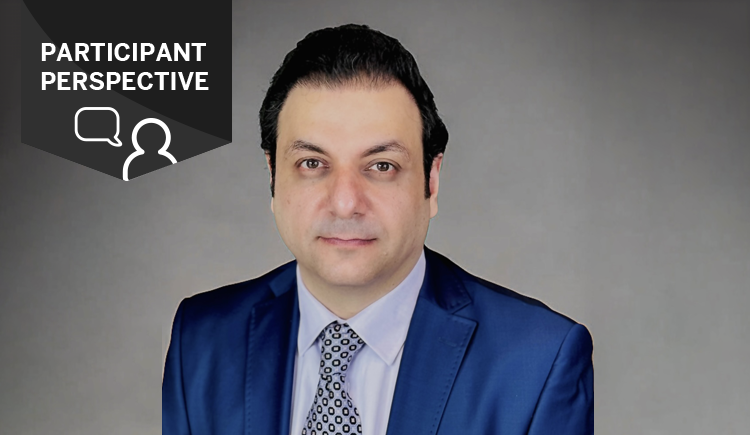
There has been much attention in recent years on the array of pharmacological and surgical interventions that now exist to address metabolic abnormalities in patients and help them take better control of their health. Yet while many of these new approaches can be effective, they should not be a substitute for making lifestyle interventions such as eating a healthful diet and controlling weight, according to A. Enrique Caballero, MD, director of the Latino Diabetes Health Program within the Division of Endocrinology, Diabetes, and Hypertension at Brigham and Women’s Hospital and associate professor of Medicine at Harvard Medical School (HMS). Caballero also serves as faculty director of Diabetes Education for Harvard’s Postgraduate Medical Education and is course director of the continuing education courses: Nutrition Management: Treating Cardiometabolic Diseases, Diabetes Update, Prevention and Management of Diabetes Complications, and Advancing Health Equity.
“We shouldn’t dismiss all of the advances that have been made to address metabolic issues—but in the end, no matter how well they all work, it’s important to recognize that lifestyle modification needs to be the cornerstone of any efforts to manage obesity, diabetes, cardiovascular disease, renal disease, and other health issues,” Caballero stresses.
Uncovering the Science Behind Different Diets
Yet he points out that many medical professionals, including physicians, allied health professionals, nurses, and dietitians, find it challenging to keep up with the science in order to provide meaningful dietary recommendations for their patients. This means many people are left to go it alone, weeding through all the fad diets and misinformation that is out there, and trying to determine themselves what approaches are safe and effective. “There is so much confusion out there. People don’t know if a diet is recommended or how to identify the difference between diet plans. This makes it essential for health care providers to take the time to understand the latest nutritional recommendations for the management of cardiovascular metabolic disease so they can guide their patients,” Caballero explains. “We also need to be sure there is science behind our decisions and not just empirical data.”
But staying up on the research is only part of the equation. Clinicians also need to be able to carve out time to discuss nutritional recommendations with patients and educate them on making smart choices. “Clinicians have very limited time with each patient to conduct a full medical history, physical exam, order lab tests, make general recommendations, prescribe medications, and discuss side effects. This means that often the nutrition piece is ignored during a clinical encounter or is briefly mentioned but is left without any practical recommendations,” he says.
“One important skill that clinicians need to develop, then, is the ability to evaluate nutritional habits in a practical way and develop individualized recommendations they can share efficiently,” Caballero stresses.
Providing Dietary Guidance for Patients
If this sounds like a tall order to achieve, it is, according to Kathy McManus, MS, RD, LDN, who serves as the director of the Department of Nutrition, of the Dietetic Internship, and of Nutrition and Behavior Modification Programs for the Intensive Lifestyle Treatment Program in the Center for Weight Management and Wellness, all at Brigham and Women’s Hospital, as well as director of Nutrition at the Dana-Farber Cancer Institute. She also co-directs the HMS Nutrition Management: Treating Cardiometabolic Disease course. She points out that it all comes down to clinicians being secure in their own knowledge. “When patients ask about any type of diet, or about eating carbohydrates, or sugar and flour, we need to be confident about the science and be sure we can respond appropriately,” she says.
Health Disparities and Nutrition
Clinicians must also remember that there is no one-size-fits-all approach out there. Rather, any nutritional recommendations clinicians share with patients must consider health disparities and be tailored to provide an equal playing field for people of all different races, cultures, lifestyles, and needs.
“There is intractable data that cardiovascular disease, obesity, hypertension, and renal disease are very common in some minority populations,” McManus says. This makes it essential to address risk factors proactively for everyone.
“There is always the question as to whether disease risk is biological or related to lifestyle choice; for many patients, it is more lifestyle-related,” she points out. Therefore, health care providers should consider how cultural practices and traditions impact a patient’s food choices and availability. “Cultural plays a role in defining what people want to eat; therefore, as health care providers, we need to ask about the quality of food and the access, that people have,” she says.
The better clinicians understand the social determinants of health that influence people’s behavior, the more likely they will be able to give meaningful, and practical, recommendations to patients.
“It requires more than just saying, ‘Here are the guidelines,’ or ‘Implement this diet,’ to your patients. You need to consider the personal factors that are so important to individuals,” McManus shares. These factors often include the fact that the patient is part of a bigger family unit, perhaps with children and aging parents, who also need to be fed. “We have to bring up the whole family continuum in conversation and make sure we are not leaving anyone out,” she says. “One of the things we can do better is to listen and understand what the patient is dealing with,” she says, in order to provide guidance that works within their reality.
Dietary Tips for All Patients
The good news is that some simple recommendations can be adapted for most patients. “In general, people should eat real whole foods, mainly plant-based,” McManus says. What these whole foods are, though, can change, depending on who the patient is and what their circumstances are.
“Health care providers should ask patients what resources exist in their communities and help them figure out how to access such whole food choices in the places they shop,” she explains.
Clinicians can also be instrumental in educating patients about how to buy healthful foods on a limited budget. “For instance, people can buy store brands, and they don’t have to buy fruits and vegetables fresh. It’s okay to get them frozen. People also don’t have to spend a lot of money on white albacore tuna, when they can buy chunk light at half of the price, and canned sardines can be a great choice,” McManus says.
User-friendly tips like these can make it easier for people to take control of their food choices, regardless of their neighborhood, financial limitations, and time constraints.
“The key is to ask your patients to tell you their story, so you can customize these types of recommendations and others for their specific needs,” she says.
When you take the time to talk about nutrition with your patients, you can help them eat better to control their weight, lower their risk factors for cardiovascular disease, and improve their overall health status in so many ways.
Written by Lisa D. Ellis
-
Resources
- Caballero, A. Enrique, MD, Director, Latino Diabetes Health Program, Division of Endocrinology, Diabetes, and Hypertension at Brigham and Women’s Hospital; and Faculty Director, Diabetes Education; Harvard Postgraduate Medical Education, and Associate Professor of Medicine at Harvard Medical School. Zoom interview November 2021. https://hms.harvard.edu/faculty-staff/enrique-caballero
- McManus, Kathy, MS, RD, LDN, Director, Department of Nutrition, Director, Dietetic Internship, and Director, Nutrition and Behavior Modification Programs for the Intensive Lifestyle Treatment Program in the Center for Weight Management, all at Brigham and Women’s Hospital; and Director of Nutrition, Dana Farber Cancer Institute, Zoom interview November 2021. https://www.health.harvard.edu/authors/katherine-d-mcmanus-ms-rd-ldn


